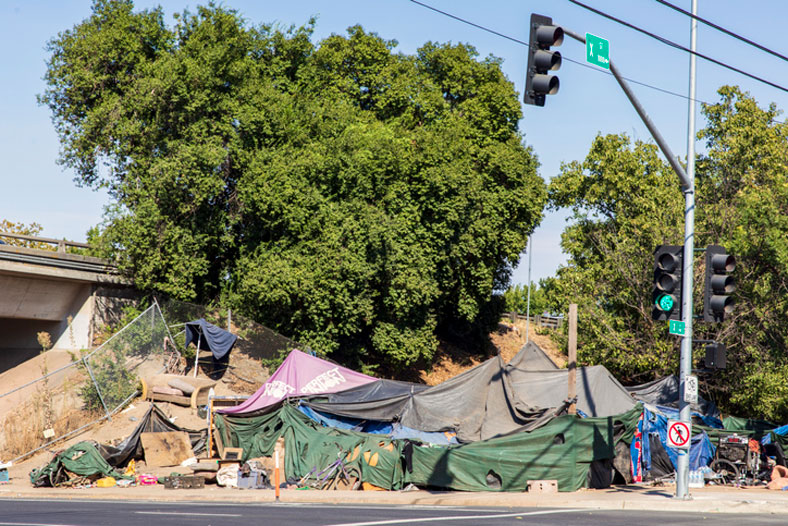Written by Sam Medley

Shortly after John Sutter founded the fort that would later become Sacramento, the settlement quickly ran into trouble. Fires ravaged the wood-and-canvas shelters of gold-seekers. Floods trapped countless residents in their homes. But despite its brushes with complete destruction, the city surged forward, becoming the state capital and a thriving cultural and economic hub.
Today, Sacramento has more modern yet equally deadly issues to contend with — the effects of a recession and a global pandemic, poverty, a mental health crisis, and the same systemic inequalities that plague cities across the nation. While the west coast’s first volunteer fire department prevented the city from turning to ash in its earliest days, the social workers of the 21st century do the same.
If you’re just beginning your social work career or are thinking about advancement opportunities, here’s what you need to know about social work jobs in Sacramento, major social service providers, the city’s most crucial issues, and what kind of salary you might earn.
Social Work Jobs in Sacramento and the City’s Most Pressing Issues
Two of Sacramento’s biggest social work employers are government agencies: the Department of Human Assistance (DHA) and the Department of Child, Family, and Adult Services (DCFAS). The DHA alone employs over 2,000 people.
The DHA and DCFAS are made up of smaller departments that provide:
- General welfare assistance.
- Mental health services
- Services to veterans.
- Adoption, fostering, and child welfare services.
- Adult protective services.
- Multiple resources to victims of domestic abuse (legal advocacy, housing, etc.).
- Childbirth and family planning services.
- Substance abuse treatment and prevention services.
- Healthcare assistance.
- Multiple services to seniors including in-home assistance, public conservatorships, and advocacy.
To bolster these already robust services, the Sacramento city government also works with over 1,600 local social service providers to serve its residents. People looking for both entry-level and advanced social work jobs in Sacramento have an impressive variety of government, private, non-profit, and community-based organizations to explore.
But while all of these services are important, here are a few career options to explore that put social workers in the middle of Sacramento’s most immediate crises.
Childcare and School Social Work
Child welfare is a pillar of any city’s social service system. But in Sacramento, removing children from dangerous situations and promoting healthy family dynamics are only a couple of a child welfare worker’s duties.

According to a survey conducted by Valley Vision, a Sacramento-based social research and community-empowerment organization, a third of parents in the California capital have little-to-no access to childcare. The poll also found that many parents feel as if local schools haven’t quite rebounded from the COVID-19 pandemic.
This is where child welfare and school social workers come to the forefront, offering a bridge between families, schools, and communities. Through the DHA’s Childcare Services division, child welfare social workers can help parents find approved childcare providers and also financial aid programs that make care more affordable. On top of that, they can help families struggling with other problems like housing and employment and offer counseling.
School social work jobs in Sacramento often involve similar responsibilities but within an educational context. Typically, school social workers work with children, families, and educators to address academic, emotional, social, and family issues. They can even connect parents to counseling, after-school care, tutoring, and nutritional services — everything a child needs to learn and thrive.
Mental Health Social Work

Valley Vision’s survey exposed another of Sacramento’s biggest problems: the bleak state of its residents’ mental health. 81% of respondents reported struggling with anxiety and stress in the week leading up to the survey. Over 50% said they experienced depression and feelings of hopelessness. But what’s perhaps even more shocking is the fact that only about a third of respondents said they had access to mental health services.
Mental health social workers can improve mental healthcare access by providing therapeutic interventions, counseling, and connecting clients to financial aid programs and other health practitioners. Licensed Clinical Social Workers (LCSWs) can even provide psychotherapeutic treatments that are often billable to insurance providers. Though mental health social work jobs in Sacramento can be found at private service providers, the DHA has agencies dedicated to providing emergency, preventive, and youth and family mental health services.
Homeless Outreach Social Work
Even though Sacramento isn’t quite as large or as expensive as some of its neighbors, a huge portion of its residents battle homelessness. And unfortunately, the problem seems to be growing.

Between 2017 and 2023, Sacramento’s homeless population grew by over 250%. But despite the fact that an estimated 10,000 people experience homelessness on any given night, the city only has room for about 2,300 people in its shelters. Many are forced to scrape by downtown. In these conditions, hunger, mental health issues, and substance abuse run rampant.
However, a 2022 partnership between the Sacramento city and county governments aims to reverse this trend by building more shelters and expanding homeless outreach services. While agencies of all kinds are involved (the DHA, housing agencies, and mental health providers, for example), Sacramento Steps Forward is the agency responsible for coordinating many of this massive initiative’s efforts. In addition to potentially creating more homeless outreach social work jobs in Sacramento, this undertaking will also require the talents of data analysts, grant writers, social work administrators, case managers, and many other types of social service professionals.
Environmental Justice Social Work
Sacramento has a long history of industry. Canneries, factories, and railway yards have all made their mark on the city’s economic and physical landscape. Today, that legacy still affects residents’ health.
According to a bulletin published by the city government, Sacramento has higher than average levels of water, soil, and air pollution when compared to other California cities. This is largely due to vehicle traffic, waste from businesses, and underground storage tanks (many of which are old, possibly leaking, and full of hazardous materials).

While this may not sound like a strictly social work-related issue, the city’s report acknowledges that many of the neighborhoods with the highest incidences of asthma have the highest percentages of people of color and the lowest median incomes.
Some of the same neighborhoods also struggle with other health concerns due to a lack of affordable, nutritious food options. In fact, the city’s report says that Sacramento has higher rates of diabetes and obesity than many cities of its size. 11% of residents have diabetes and 30% are obese. All together, these circumstances mean that environmental justice social work jobs in Sacramento may be some of the most complex in the city.
Social workers who want to help Sacramento achieve its goal of a healthier city may be able to find jobs working with city social service providers, community-based organizations, healthcare organizations, and local advocacy groups. Because sanitary housing, healthcare access, public health education, and creating equity are central to this effort, social workers of all kinds may be needed to enact impactful, long-term change.
Unrivaled Optimism: Sacramento Residents Believe in Their Hometown
After reading about all of Sacramento’s problems, it’s easy to conclude that the city’s future is grim or that its residents wish they lived somewhere else. That couldn’t be further from the truth.
According to the Valley View survey, most Sacramento residents feel a strong sense of support, acceptance, and connection with their neighbors. About 33% say they want to learn new skills and wish they had more access to job training and educational resources. So despite problems with mental health, poverty, and pollution, many people in Sacramento believe that there’s hope, that with a little work, their hometown can become a great place to live. By taking on a social work job in Sacramento, you can turn that belief into a reality. It may be a long path, but with that kind of optimism, the hard work will certainly be worth it.
Social Worker Salaries in Sacramento
The Greater Sacramento Economic Council estimates that the cost of living in the city is 18% higher than the national average, but about 7% lower than the rest of the state. While this means that Sacramento might be one of the more affordable places to live in California, it may be even more attractive to social workers.
According to the Bureau of Labor Statistics (BLS), the national average salary for social workers ranges between $56,680 and $64,360 depending on specialty. The average salary for social workers in the Sacramento-Roseville-Arden-Arcade area ranges between $64,250 and $92,600. This can vary depending on employer, specialty, and an individual’s education and experience.
The following table uses information from the BLS’s 2022 occupational survey to provide a more in-depth look into social work salaries in Sacramento. Those in the 90th percentile (the top 10% of earners) are often the most experienced social workers who hold Master’s degrees in Social Work (MSW), state-issued clinical licenses, and advanced positions in their organizations. Given the amount of social service agencies in the city, it seems as if social work jobs in Sacramento leave plenty of room for career advancement.
Social Work Specialty | 10% | 25% | 50% (Median) | 75% | 90% |
Child, Family, and School Social Workers | $39,660 | $48,530 | $65,560 | $81,920 | $81,920 |
Healthcare Social Workers | $55,330 | $65,940 | $82,770 | $116,490 | $135,970 |
Mental Health and Substance Abuse Social Workers | $43,980 | $50,710 | $66,810 | $105,970 | $128,860 |
Social Workers (All Other) | $43,360 | $48,090 | $62,680 | $85,020 | $105,730 |
Table data taken from 2022 BLS reports for the Sacramento-Roseville-Arden-Arcade, California, metropolitan area.
2022 US Bureau of Labor Statistics job market trends and salary figures for child, family, and school social workers, healthcare social workers, mental health and substance abuse social workers, and social workers (all other) are based on national data, not school-specific information. Conditions in your area may vary. Data accessed August 2023.




